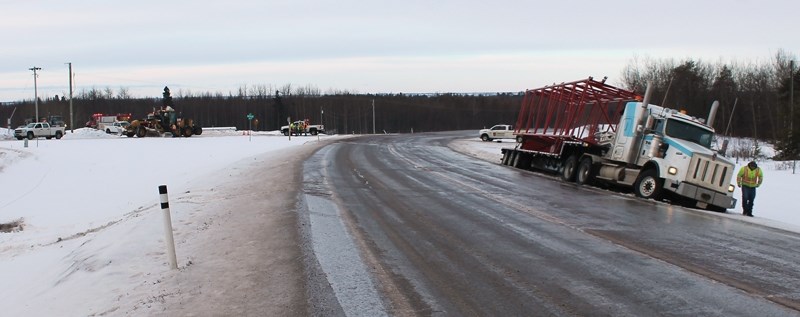Spring’s variable weather can cause havoc on our roads and local RCMP officers and Alberta Transportation officials are advising drivers to be courteous and drive to the conditions.
Roads can start the day clean and dry and end up snow covered, or snowy streets can turn slush and then refreeze just as quickly.
“On a day like today, where it’s -1 C, it’s very slushy and very slippery and people are getting stuck a lot,” said Westlock RCMP Const. Rick Buisseret.
One important thing you can do to make sure your travel is safe and you arrive at your destination in one piece is ensuring your vehicle is operating correctly and your windshield fluid is topped up.
It only takes a few passing cars and trucks and you can’t see anything on the road in front of you.
“If your windshield isn’t cleaned properly it is an offence under the Traffic Safety Act,” Buisseret said.
Recently, police assisted a driver on Highway 2, south of Clyde, who had run out of fluid and had a windshield described as “you couldn’t hardly see out of the thing at all.”
On that occasion a RCMP officer was able to provide enough windshield fluid to get the driver through to a gas station.
The road itself is also a hazard and now is the time of year when drivers need to pay extra attention as they can quickly find themselves spinning out of control.
Extended waiting times for tow trucks can leave you stuck beside the road and there are some simple things you can do to prevent both the accident happening in the first place, and if it does, making sure you don’t get into more trouble.
Should you find yourself in a ditch, Buisseret suggested having an emergency roadside kit that includes a cell phone, warm clothes, blankets, candles and a flashlight — and to advise people of where you’re going and check in with them when you arrive.
“You have to be prepared in case your vehicle does enter the ditch,” Buisseret said.
Alberta Transportation also suggests drivers use the 511 Alberta service before they travel.
511 Alberta provides up-to-date road condition information through a number of channels, including an app available for smart phones.
The department is reminding drivers to wear their seatbelts as doing so increases your chance of surviving a serious road accident by 50 per cent.
“Seatbelts are a big factor, especially in rural Alberta,” said Jamie Friesen, spokesperson for Alberta Transportation. “It’s estimated about 1,000 people a year are saved by seatbelts each year alone across Canada.”
While the number of fatal crashes is lower during the spring months, accidents involving property damage and injury are higher.
In 2013, the Westlock region recorded three road deaths and 49 injuries.
Buisseret is also reminding drivers to be courteous to others on the road.
“Not everybody’s winter driving skills are the same,” he said. “Somebody that is quite comfortable driving in adverse road conditions at 100 km/h needs to remember that the next person might only be comfortable at 80 km/h,” he said.
“You people who end up behind someone who is doing 80 in a 100 zone and they get impatient and want to pass and a lot of times the lines on the highway are obscured, so you really have to judge what’s safe for you and for everybody else on the road.”
When it comes to car size, bigger is better isn’t always true.
Large pick-ups and 4x4s are just as unsafe when the road conditions are icy and there’s potential to slide off the road, said Buisseret.
Also, four-wheel drive has no impact on stopping power and extra speed and weight dynamics can add to stopping distances.
“I have seen a lot of pick-ups in the ditch, and a lot of them are 4x4s” said Buisseret. “You don’t see many small cars in the ditch and those people might be a little more conscious of the fact the road conditions are not as good as they could be.”
Buisseret also said that the myth that the RCMP wouldn’t fine people for travelling less than 10 km/h is not true.
“We will fine you for 10 km/h over,” he said. “Whether or not we do is purely at officer discretion.”

